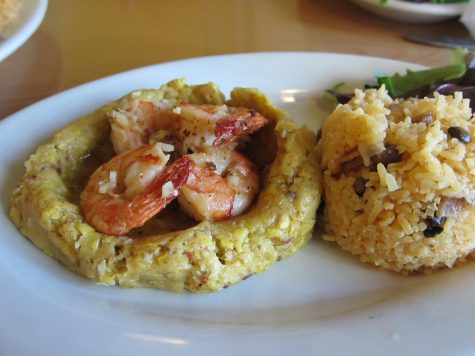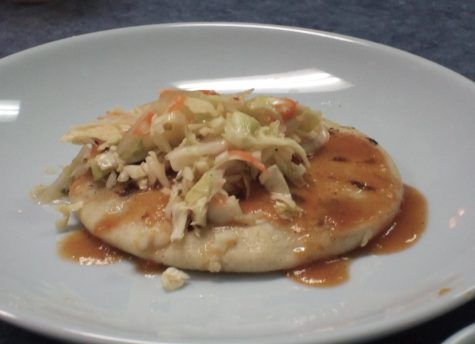Von Diaz’s Coconuts and Collards: The Blending of Our Stories
October 5, 2022
Hispanic Heritage Month Book Review
“Coconuts and Collards: Recipes and Stories from Puerto Rico to the Deep South”, a memoir-style cookbook by Von Diaz, has allowed the idea of heritage cooking to seep into everyone’s special courses. Heritage cooking is the culinary trend in which people bring conventional cooking ingredients and practices from their initial homes to the new places they are living in. It is the act of combining family recipes passed down from generations with modern cooking styles, or flavors of new places. Diaz’s curiosity over the common similarity of deep-frying food between Puerto Rico and Georgia made her realize that every dish’s story can connect cultures and lead us to finding a version of ourselves that does not have to seek a way to fit into differing communities; they can simply create their own sense of belonging by combining customs of both upbringings.

In the midst of Hispanic Heritage Month, many Puerto Rican families are glued to their kitchens blending garlic, onions, peppers, and herbs to make sofrito, a vibrant puree that is the foundation of flavor for many Puerto Rican and other Hispanic Caribbean dishes. Each ingredient adds its own quality to compliment the qualities of another. It is parallel to how aspects of one culture can blend with others, building new traditions while complementing initial customs. The act of combining ingredients such as yautia and green bananas with sofrito does not come from a single place. Foods share the same depth in the complexities of their origin as people’s stories. The traditional dish of mofongo in Puerto Rico pulls pieces of its Spanish, Indigenous, and African flavors to craft such a culinary masterpiece. Yet, many tend to overlook the components that make something what it is.
Von Diaz, a writer, chef, and documentarian who is known for various cookbooks and articles published in The Washington Post and NPR, and her speech, “Every Dish Has a Story: Mapping My Food History,” at 2015’s TEDxPiscataquaRiver Talk. Throughout her childhood, she would fly to her birthplace, Rio Piedras, Puerto Rico, and back to her new home in Atlanta, Georgia, struggling to find where she truly belonged. Her confusion could not subside her yearning to be fully immersed in Puerto Rican culture, especially when it came to learning how to make traditional recipes with her grandmother and this food is what tied her to the tropical island. She now encourages experimentation and self-expression through cooking, showing “authentic” foods stem beyond the roots of their native country. Von’s experiences are a reminder that other cultures can have their distinct differences to stand out while sharing similarities to connect them. An example of this is the Salvadoran and Honduran pupusa is directly parallel to the Venezuelan arepas. Popusas may be larger and flatter and made with masa hernia instead of the arepa’s masarepa, but both are corn cakes, bursting with flavor. Heritage cooking can now be seen through the variety of restaurants spread across Central Florida. People do not even need to drive a full hour to come across Venezuelan, Cuban, Salvadorian, and especially Puerto Rican bakeries who have brought a piece of the heart of their cultures to the mainland.

As Diaz notes, “With history and culture as your guides, the path to creating delicious foods can reveal connections to your past and to others you wouldn’t otherwise see.” In writing “Coconuts and Collards“, she realized that the single story of a plate of food is intertwined with tales that go beyond the dish; they reside with history and personal memories.
Each recipe begins with an account of what inspired Diaz to craft the dish, or a memory, such as the times experimenting in the kitchen with her mother and grandmother, that she heavily associates with it. Many have been finding such bonds to say “so much about where we’re from, and even more about who we want to be,” according to Diaz.
Many people, especially those who were taken away from their original homes and exposed to different styles of life at a young age like Von Diaz, have lived or currently live with reticence towards the kitchen to avoid feeling embarrassed that they assimilate with one of their ethnicities over the others or none of them. Von Diaz’s cookbook reflects the fact that one does not have to succumb to the pressures of being fully knowledgeable in the places they are from, along with their ancestry.
However, it is more than just combining flavors to eat. Food fulfills more than simply the need for bodily satisfaction, it conjures supplements for the needs of one’s heart. To Diaz, sofrito is essential for her cooking, but it can also fill people’s need for nostalgia. “A dish may be essential because it fills your heart with joyful memories, of smells and flavors, of your grandmother loudly playing Juan Luis Guerra, teaching you to dance, her hair still in rollers” she explains. It can even serve as a reminder to people of the hard work they have put in to get to where they are, similar to minorities of colonial times who would reward themselves with a meal that maintains their energy and will to persevere to the next day. Carrying what is familiar to you makes you more comfortable to venture out and explore anything new.
“Coconuts and Collards” relates to all people who have experienced moving to a new place. Diaz instantly creates a sense of trust, compelling the reader to be open to trying her dishes found throughout the book. Amongst the naturistic photos used as homage to her birthplace, her authenticity grows with the stringing of each memory, mapping her journey to reinforcing her identity in Georgia as well. This will inevitably seep into other people’s lives because regardless of culture, everyone has components of food that can be connected with other cultures to expand everyone’s palate.




